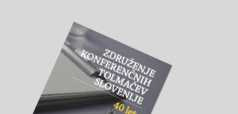The Slovene Association of Conference Interpreters (ZKTS) was founded in December 1972. It was the first and is still the only professional association of conference interpreters in Slovenia.
In its early days, the ZKTS played a pivotal role in achieving recognition for the conference interpreting profession in Slovenia, as well as working standards, principles and conditions. An important element of its mission was to raise client awareness about the specific nature of conference interpreting as a profession.
In the 1970s, the ZKTS invested great efforts in achieving the recognition of Slovene as a conference language. In that period, Serbo-Croatian served as the lingua franca of the former Yugoslavia. It was common for high-level delegations visiting Slovenia to hire interpreters for Serbo-Croatian, believing there were no practising interpreters for the Slovene language.
Another challenge was to have the interpreting profession listed in the national classification of occupations, based on which interpreters could practice as freelancers. The Association's members contributed significantly to organising and launching interpreter education and training courses in Slovenia, which further contributed to compliance with professional standards, principles and working conditions. Many of its members still play an important role in interpreter training both in Slovenia and abroad.
In the 1990s, after Slovenia became an independent state, its members contributed greatly to the ultimate recognition of the interpreting profession by consistently providing high-quality interpretation services at the historic events of that period.
The post-independence period was characterised by integration into the European Union and Slovenia's membership of international organisations such as the Council of Europe, the UN and the OSCE. With membership of the EU and NATO, the Slovene language was further consolidated at the international level. ZKTS members played an important role as interpreters in the EU accession negotiations, as well as the alignment of legislation and the enlargement processes. Slovene was recognised as an official EU language, and interpretation into and from Slovene became a regular part of the language regime in the European Parliament, the Council of the EU, and the Court of the EU, where ZKTS members work on a regular basis.
In recent years, the primary concern of the ZKTS has been to protect the professional interests of its members and maintain adequate working conditions and technical standards in an increasingly competitive and price-driven environment. One of its top priorities has always been awareness-raising among conference organisers and users of conference interpreting about the need to engage experienced, highly qualified and reliable conference interpreters for multilingual events.
ZKTS members consistently adhere to the international professional standards, quality principles and the Code of Professional Ethics of the International Association of Conference Interpreters (AIIC), established in 1953.



